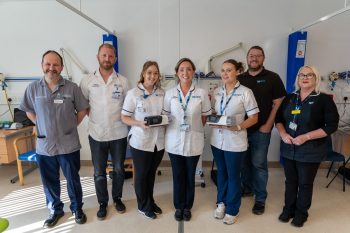
Patients experiencing obstructive sleep apnoea, a condition when breathing stops and starts, are getting a good night’s rest thanks to the Ulster Hospital’s Group CPAP (Continuous Positive Airway Pressure) Clinic.
Ulster Hospital Chief Respiratory Physiologist Gemma Moss explained how she along with the team are working and assisting to, “Make ‘dreams’ possible with the introduction of the CPAP Clinic.”
Gemma added that since the setup of the group clinic in August 2024, waiting times for patients with sleep apnoea, waiting for their appointment to get therapy, have halved with the team able to set up 12 patients with their CPAP machine within a one and half hour period. If carried out on an individual basis it would take 12 hours.
“CPAP leads to better quality sleep, better quality rest for our patients. With sleep apnoea, oxygen levels fall and the heart rate spikes. If left untreated this can lead to extreme daytime fatigue, heart attacks and diabetes among other things.
“The CPAP machine, which sits on the patient’s bedside locker, and is connected to the patients face with a mask, blows a pressure of air into the upper airway – just enough to keep the airway open so that obstructive sleep apnoea is treated. The heart remains stable during sleeping hours,” said Gemma.
Service User Jonathan Keatings shared how he had contacted his GP at the request of his family to sort out his snoring. “I was referred to the CPAP clinic and it is very relaxed and very informed. It is a place to come and have your CPAP mask fitted, very comfortably and hopefully it helps!”
Gemma added how through the Clinic, patients have the chance to openly discuss their condition with others. “We are providing the patient with peer support and helping that patient – and their partners, get a good night’s rest.”



